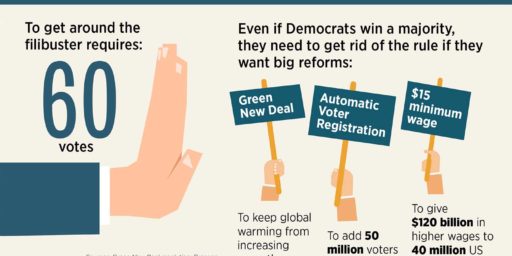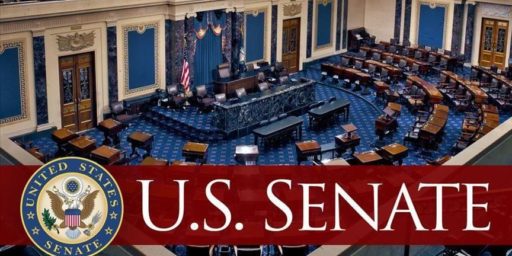Why Republicans like the Filibuster
It creates a veto gate that they are almost guaranteed to control when they need it.

Note: the Jimmy Stewart filibuster is almost entirely a thing of legend/fiction and most “filibusters” are procedural actions that come with very little cost in time and effort.
As James Joyner noted in a post yesterday, the legislative filibuster is likely to go the way of the Dodo should the Democratic Party win control of the Senate in the upcoming election. The reason is pretty straight-forward: it will be the only way to get anything done legislatively.
Let me respond to/expand on something James noted in his post:
as shrewdly and shamelessly as McConnell has wielded power, he didn’t eliminate the filibuster over ordinary legislation in the early part of Donald Trump’s presidency, when Republicans held the White House, House of Representatives, and the Senate and could therefore have rammed through anything they wanted. He did in fact take a longer view.
So, why did McConnell “take a longer view” and not scuttle the filibuster during the previous congress so as to give the unified Republican majority an easier pathway towards legislating? His long view was not about maintaining established norms, his long view was about maintaining a Republican advantage.
Plus, note, the Republicans were able to get their main legislative goal, tax cuts, through while maintaining the filibuster. Their only major legislative defeat was their inability to “repeal and replace” Obamacare, something that has always seemed more slogan than coherent goal.
Consider that at the moment, and for the foreseeable future, the Republican Party is actually a minority party in the sense that nationally, Democrats tend to win more votes than do Republicans. For example, as I have noted numerous times of late, the GOP has only won the national popular vote for President once since doing so in 1988 (in 2004 when George W. Bush re-elected). That is one time in over thirty years. Of course, the Electoral College helps tilt the playing field back in the GOP’s direction, as it did in 2000 and 2016.
The GOP is also at a disadvantage in winning control of the House of Representatives, which is predicated largely on population. Caveats apply, such as the way in which single seat districts cause problems for representation. Indeed, in two recent elections, 1996 and 2012, the party that won fewer votes nationally won the majority of seats in the House (both times, the GOP).* Single seat districts lead to over-emphasis on non-urban districts, which favors the GOP (this is the issue of geographic sorting). Gerrymandering also creates distortions that would not be present if we used even moderate proportional representation with multi-seat districts.**
The Senate, of course, with its two seats per state, is not dictated by national partisan preferences but still can very much favor one party over the other. It stands to reason that the more rural-oriented, conservative party would do better in the Senate, since the Senate privileges, in terms of representation, those kinds of voters. This advantages the Republicans, at least in this current era of our politics.
The quick tour through partisan advantages and disadvantages in national legislative and executive elections is to underscore that the Senate is a linchpin, if not a fail-safe, for the GOP and the legislative filibuster is a huge part of that scenario. As long as the legislative filibuster remains in place, the Republicans know that all they really need to forestall any substantive policy change is 41 seats in the Senate, which is practically guaranteed.
Note that getting the 60 vote majority is nearly impossible to achieve, so the GOP knows that as long as the filibuster remains in place, it can stop most of what a Democratic House might vote out, even if the Democrats also control the majority in the Senate.
It is worth noting that since the 1970s capturing 60 votes (which was common in the 1960s) in the Senate is much like capturing unicorns. The Democrats did have 61 seats back in the 94th (1975-1977) and 95th (1977-1979) Congresses. But, of course, that was a) in the wake of Watergate, and b) when the South was almost solidly Democratic.
We have only seen one other case of a 60-vote majority since then (well, actually two): during the 111th (2009-2011) Congress.
Note that in the 111th Congress, during Obama’s first term, the Democrats controlled 60 votes only for a brief amount of time in two different windows. The exact details are in the linked post, but the summary is that “the Democrats had a 60-seats majority (and true control of the Senate) from July 7, 2009-August 25, 2009 and from September 25, 2009-February 4, 2010.”
In simple terms: a 60-vote majority just isn’t normal nor is it likely.
So, what we have are two institutions that favor majority preferences (the House and the Presidency), but with caveats, and one that favors minority preferences (the Senate).
And, the Senate has long had an institutional mechanism, the filibuster, that has made it a significant veto gate in our policy-making process, one that has increasingly been used in our era of polarized parties. It is a veto gate that is practically impossible to unlock because there is no culture of consensus-building in the Senate, and specifically the GOP of this era is not especially interested in legislating (rather, in the Senate, they are mostly focused on confirming judges, which already lack a filibuster route for the opposition).
In short, the Republicans have every incentive to want to maintain the ability of 41 Senators to essential be able to block almost*** every legislative action in the Senate, while the Democrats have increasingly come to the realization that they are better off to take advantage of unified government when it happens (since it is more likely for them) or to hope, at least, that they control either the House and/or the presidency when the GOP controls the Senate.
Even shorter: the filibuster far more helps the Reps and constrains the Dems than anything else, and hence it can’t last.
As such, I figure if the Democrats win unified government in November, the filibuster is gone.
*Some additional discussion of this in my 2018 post, The US’ Flawed Democracy
**And yes, gerrymandering helps Democrats in some cases as well.
***There are some legislative actions, such as budget reconciliation, that are not subject to a filibuster.






“Plus, note, the Republicans were able to get their main legislative goal, tax cuts, through while maintaining the filibuster. Their only major legislative defeat was their inability to “repeal and replace” Obamacare, something that has always seemed more slogan than coherent goal.”
And they likely would have passed repeal and replace Obamacare if they actually had something to replace it with. The filibuster is not what stopped passage of the bill killing Obamacare, but instead defections by Republican Senators who wanted to actually replace it with something which kept the popular aspects of it.
Otherwise, I generally agree with your points.
Yes, we’re in agreement with a very small caveat: the filibuster advantages “red” states, not just Republicans. That’s why I think a Manchin (D, WV) or a Democratic Senator from Arizona, Montana, or any number of red states that would be needed to flip to achieve a Democratic majority may well be reluctant to give up leverage that tends to redound to the advantage of their state. Otherwise, for example, a filibuster-unburdened Democratic Congress and President could massively increase the size of the House of Representatives, dramatically eroding red state (and also Republican) voting power in Congress but also the Electoral College.
@James Joyner: I would have to think about this a bit more, but I am not sure I agree with the framing. Manchin’s power as a pivotal vote would potentially increase without the filibuster, as in a close Senate (and the Senate is almost always close) each marginal vote will matter. If the Dems have to convince Manchin and Collins to get to 51 or 50, then they remain quite powerful. You don’t need the filibuster for that.
Indeed, since the filibuster only allows for blockage, and not proactive policy choices, being the pivotal vote on legislation gives you leverage to actually get something for your state.
@Steven L. Taylor:
Absolutely. But smaller, more rural states worry about having the values of urban America imposed on them. West Virginia and Montana voters don’t want Green New Deal, Medicare4All, and the like. And they certainly don’t want a Supreme Court packed with liberals or a 1000-seat House of Representatives. Loss aversion is an incredibly powerful motivating force.
Interestingly enough, according to this from around 15 months ago WV shows roughly 48% support for the Green New Deal and Montana around 51%.
I have to admit, I did not see that coming.
@James Joyner:
As you know, I favor adding a lot of seats to the House for the very reason you listed — it’ll make the House more representative of the country — but the effect on the electoral college would be minimal. Even tripling the size of the House wouldn’t have had a noticeable effect on the 2016 election, though it might have affected the 2000 election. I built a spreadsheet to test the 2016 election and it did nothing.
Of course, Trump won three states by less than an aggregate of 80,000 votes. Nothing would change that sort of thing.
@James Joyner: If the Democrats win a Senate voting majority, then it is probable that majority will include 13 or 14 Senators from states that are either one of the 10 most rural, or 10 smallest populations, or both. This at least raises the question of whether Schumer can come up with 51 votes to kill the filibuster. (I don’t think the VP votes on rules, although I may be wrong about that.)
@James Joyner:
I think that is true of WV and MT Republicans–I actually do not think that WV and MT Democrats hold the same view. I honestly don’t think that “small state” logic applies to Dems in those states.
Granted, the exact degree to which there is consensus in the Democratic Party on Medicate for All or the Green New Deal is a whole other debate, of course.
I honestly think that the narrative that there is a “small state” mindset is an incorrect one that derives from our mythology about the Founding.
For example, I suspect a lot of small state Dems would gladly do away with the Electoral College and be in favor of a larger House.
Unless I’m reading the law wrong (a distinct possibility) it seems a simple majority in Congress can vote to admit a state. Kill the filibuster, grant statehood to the District and Puerto Rico. That adds four Democratic senators and seriously reduces the rural advantage by two Dakotas.
@Robert Prather:
I’d have to see the numbers but having 1100 electors vice 538 would seem significant, in that it would greatly diminish the power of the less populous states and increase the power of the more populous states.
@Steven L. Taylor: Yes, I really mean rural state moreso than small, although they tend to overlap. Democratic Senators in red states just have very different values and interests than those in the party as a whole. I can’t see a Joe Manchin voting for the Progressive agenda even if there were no electoral consequences.
@James Joyner: I can send you the spreadsheet if you like. In fact, I will.
@Michael Reynolds: I think they could admit PR tomorrow. DC is very complicated, especially given that already has three Electoral votes. Even if Congress created Douglas or whatever and left a rump district and the courts ruled that was constitutional (I tend to think it would be), that district would have three Electors. That would be bizarre and perverse.
@James Joyner:
Sure, but like I said: I don’t see how that matters in terms of getting rid of the filibuster or not, and actually think that his relative voting significance might be enhanced without it.
Granted, he could change party if he couldn’t bear the Dems’ liberalism and in a 50-50 Senate make all the difference. It just depends on scenarios.
@James Joyner:
I would need to read it myself, but I believe Congress could dispose of those electoral votes as it sees fit.
@James Joyner:
One suspects that they could get the GOP to go along with an amendment to remove the 3 for DC (or, they might be inclined to leave them, which would be bizarre, and maybe somewhat perverse, but I am to the point that it wouldn’t be less bizarre or perverse than the EC itself. Maybe that would create a bargaining chip for an amendment to move to the popular vote–and I may have just convinced myself that that is an awesome idea…).
@James Joyner:
I imagine we can get around that. And just wait til it comes time to pick a name for the new states. Can you say, ‘major corporate branding opportunity?’
Yeah, I used to live in Virginia, but then I moved to Exxonomia.
@James Joyner:
On that last one, I’m not sure. The Republican establishment wouldn’t like it, but the voters? Smaller districts mean that Representatives are more responsive to local issues, and more accessible.
The way districts are drawn in a lot of medium sized red states is to try to spread out the Democrats so they are 40% of each district, which means slicing the urban areas, and most representatives having a bit of the Big City Business Interests. They don’t really represent Small Town Values.
A lot of people may not feel like they have a voice in the federal government now, and this could give them one. People love being heard.
Imagine the loons that will be elected from districts where cows literally outnumber people ten to one. QAnon, Klansmen, Proud Boys and maybe some old-school Birchers.
@Michael Reynolds: I’m a Mountain West Dem and got to observe the state legislature from the inside as a permanent non-partisan staffer during the critical period as my state went from being reliably red to (almost) reliably blue. Regional resentment of the NE urban corridor, at least among the political class, is a long-time thing that still exists today. The largest group of registered voters in the state are the unaffiliated. This week the moderate Democrat thumped the progressive Democrat in the US Senate primary. I remain unconvinced that the Dems in our Congressional delegation will support DC, or even PR statehood.
@Michael Cain:
Democrats willing to face the inevitable accusation that they just don’t want representation for black and brown people, while opposing their own party? I’d bet not.
IMHO, the biggest driver will be what tipping point people want to accomplish/block. For example, if you are the 50th and 51st vote in the Dem Senate, the filibuster cuts your power. Without it, *you* are the gate; with it, the GOP is the gate.
Also, getting PR in as a state increases the Democratic Party’s ability to keep the Senate. Again, if you are vote 50 and 51, losing a couple of other Senators puts you back in the minority.
@Barry:
Depends on how many seats the party has. If you are the 50th vote in a 50-50 Senate and your party has the WH or if you are a 51st vote in a 51-49 Senate, does not being the final vote enhance your bargaining position if the filibuster is gone?
@Michael Reynolds:
In the novel Infinite Jest, corporations were given the opportunity to buy the naming rights for a year, so like instead of having the year 2020 you have The Year of the Depend Adult Undergarments.
@Gustopher: I’m not sure how it would play electorally. I’m just thinking as a political scientist.
Like Robert Prather (and I’m pretty sure Steven Taylor) I favor radically increasing the size of the House as the most practical reform to fix a system that’s long since been outmoded. But doing so greatly advantages California, New York, Texas, and Florida and greatly disadvantages Montana and a handful of other low population, rural states vis-a-vis the current arrangement. Even though I don’t, on balance, favor them I think many of the policies the AOC-Sanders wing would be good for people in places like Montana and West Virginia. Culturally, though, they’re among the most adamantly opposed to said policies.
@Michael Reynolds: I expect they’ll vote for it eventually, but there’s likely to be horse-trading. “What’s New Columbia getting out of this? Two Senators and the feds very largely off their back about land use? What’s Puerto Rico getting? Two Senators, four or so Representatives, and probably their entire power grid rebuilt? Colorado would like BLM’s land and water use planning authority transferred to the state, and control of the Western Area Power Administration’s transmission network.”
The original BLM, the one that the Western Governors Association staff means when they ask, “Do you know what those d*ckheads at BLM have done now?”
@James Joyner: It is possibly worth noting that Bullock’s predecessor as Governor of Montana, also a Democrat, said, “Give me all of the money that the feds spend on health care in Montana and we’ll have single payer. We’ll use Saskatchewan as our model.” And then got reelected. They’re a little weird. Montana currently has the longest streak of any state for at least one of their US Senators being a Democrat, dating back to 1911.
@Steven L. Taylor: “Depends on how many seats the party has. If you are the 50th vote in a 50-50 Senate and your party has the WH or if you are a 51st vote in a 51-49 Senate, does not being the final vote enhance your bargaining position if the filibuster is gone?”
That’s what I meant.
@Barry: Gotcha. I orginally misread/misunderstood your comment.
How sad that so many people vote against their own interests because of concepts like culture and race…of course, so many politicians, particularly Republicans, depend on this to retain power…
@James Joyner:
Which would make a 129% increase in the size of the House. I’m all in favor of hypotheticals, but in what universe is this a hypothetical? Who would vote for that–on either side of the aisle?
@Just nutha ignint cracker:
I’d think pretty much every Democrat in the House and most Democrats in the Senate. It would significantly increase their ability to elect Democratic Presidents and enact progressive legislation.
In the world envisioned by James Madison, they’d oppose it because it watered down their own voting power and that of their constituents. But we’re now in a world where all that matters is party.
@James Joyner:
I would hope that it would happen simply because the House, as it exists right now, is not representative of the people. Even a cursory glance at it demonstrates this.
In order to control the House, the Democrats have to win the popular vote by as much as 7% on the generic ballot. There are a lot of wasted votes due to line drawing and the requirement that every state have at least one representative adds to this.
It overweights the House in favor of small states and the Senate, by design, already does this. It’s too much.